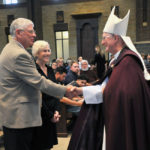What is consciousness? What is the relationship between the mind and the brain? What is the nature of humanity? What is the purpose of life? These are the kinds of philosophical questions arising with the rapidly developing field of science known as Artificial Intelligence (AI). The innovators themselves are asking these questions of the Church. “They want guidance and support,” says Father Philip Larrey, a professor of philosophy at Rome’s Pontifical Lateran University in a video titled “AI: The Church’s Response”
(usccb.org/resources/ai-churchs-response-0).
Thank God, our Church is willing and able to respond. As the body of Christ, we too, have an essential role in play — to pray and to study, to discern and to respond wisely, charitably and courageously to this paradigm shift in our life on planet earth.
The Holy Father will join seven of the world’s advanced economies (G7) for a meeting in mid-June to discuss AI, defined as “technology that enables computers and machines to simulate human intelligence and problem-solving capabilities” (ibm.com/topics/artificial-intelligence). The topic raises both fear and excitement and generates plenty of hype. Pope Francis insists that the evolving development of AI must place humanity at the center.
He will be the first pope to participate in the G7’s work, Catholic News Service reported April 26. The G7, composed of the leaders of Canada, France, Germany, Italy, Japan, the United Kingdom and the United States, plans to meet June 13-15 in southern Italy. The Vatican has been a leader in promoting ethical reflections on AI since 2020, with its ‘“Rome Call for AI Ethics,’ a project coordinated by the Pontifical Academy for Life that has been signed by top leaders of Microsoft, IBM, Cisco and other major players in the field,” CNS reported.
Throughout his papacy, Pope Francis has set the example for us through his active engagement in the public square, addressing the paramount issues of our time, including AI, and their impact, especially, upon the least among us. Even his World Day of Peace message this year (https://tinyurl.com/muhu55fh) addressed the promises and risks of AI. A positive outcome, he said, “will only be achieved if we show ourselves capable of acting responsibly and respect such fundamental human values as ‘inclusion, transparency, security, equity, privacy and reliability.’”
We cannot presume that the people who design algorithms and digital technologies will act ethically and responsibly, the Holy Father said. “There is a need to strengthen or, if necessary, to establish bodies charged with examining the ethical issues arising in this field and protecting the rights of those who employ forms of artificial intelligence or are affected by them.” We must avoid the temptation “to selfishness, self-interest, the desire for profit and the thirst for power.” We must broaden our gaze and “direct techno-scientific research towards the pursuit of peace and the common good, in the service of the integral development of individuals and communities.”
Last week, Catholic Answers, a nonprofit media ministry that answers questions about what the Church teaches, received intense backlash from its introduction of “Father Justin,” an AI generated “priest,” who clearly looked like a cartoon character. The company intended to create a tribute to parish priests and an “‘authoritative yet approachable’ figure on Catholic teaching,” as OSV reporter Gina Christian reported. However, some online viewers took offense to his statements “indicating that he could actually give absolution and preside at the sacrament of matrimony.” Catholic Answers swiftly “laicized” Father Justin to plain “Justin.” The media company was taken aback by the hostile reaction and outrage of the online criticism but remains committed to exploring artificial intelligence (see Page 6).
A tenet of our Catholic faith is “in all things, charity,” which applies to interactions — in person or online. In a world fraught with anxiety and suspicion and that demands instantaneous response to perceived wrongs or slights, let us pray “This is how all will know that you are my disciples, if you have love for one another” (Jn 13:34).
AI raises our anxiety level, as a nation and around the world because we don’t know what the future holds. Let us follow the example of our 87-year-old pope, who is addressing this issue through prayer, study, discernment and interaction with others. Visit the USCCB website for information and resources regarding AI (usccb.org/search?key=Artificial%20Intelligence). Continue to read The Catholic Messenger, for future articles about the intersection between AI and faith. Consider creating or joining small faith group discussions on AI to address the questions raised at the beginning of this editorial: What is consciousness? What is the relationship between the mind and the brain? What is the nature of humanity? What is the purpose of life?
Barb Arland-Fye, Editor
arland-fye@davenportdiocese.org












